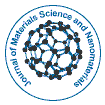Nuestro grupo organiza más de 3000 Series de conferencias Eventos cada año en EE. UU., Europa y América. Asia con el apoyo de 1.000 sociedades científicas más y publica más de 700 Acceso abierto Revistas que contienen más de 50.000 personalidades eminentes, científicos de renombre como miembros del consejo editorial.
Revistas de acceso abierto que ganan más lectores y citas
700 revistas y 15 000 000 de lectores Cada revista obtiene más de 25 000 lectores
Abstracto
Analysis as a Micro Fibrous Graft for Components in Synthetic Biology
Kyaw Myo Zaw
A biocompatible and biodegradable poly (1,4-butylene succinate) microfibrous tubular scaffold has been produced through the use of electrospinning.The scaffold’s morphology was N-optimized to prevent cell infiltration through the graft’s wall and to promote cell integration, adhesion, and growth as a micro-porous conduit with a small diameter.The scaffold’s mechanical properties and morphology were examined and compared to those of native conduits.Scaffolds were then seeded with adult normal human dermal fibroblasts to test cytocompatibility in vitro.The hemolytic effect was assessed following incubation with whole blood that had been diluted.The graft is able to provide initial mechanical support and functionality thanks to the demonstrated degradation profile during colonization and subsequent replacement by host cells. Elastic modulus (less than 17.5 1.6 MPa), ultimate tensile stress (less than 3.95 0.17 MPa), strain to failure (less than 57 4.5%), and suture retention force (less than 2.65 0.32 N) were all within the physiological range for tubular conduits. There was no delamination of the scaffold’s mechanical properties.This combination of properties may make it possible to use PBS as a biomaterial to create scaffolds that support host cell remodelling and provide structure and function over time.
Revistas por tema
- Agricultura y acuicultura
- Alimentación y Nutrición
- Bioinformática y biología de sistemas
- Bioquímica
- Ciencia de los Materiales
- Ciencia general
- Ciencias Ambientales
- Ciencias Clínicas
- Ciencias farmacéuticas
- Ciencias Médicas
- Ciencias Sociales y Políticas
- Ciencias Veterinarias
- Enfermería y atención sanitaria
- Física
- Genética y biología molecular
- Geología y Ciencias de la Tierra
- Ingeniería
- Inmunología y Microbiología
- Química
Revistas clínicas y médicas
- Anestesiología
- Biología Molecular
- Cardiología
- Cirugía
- Cuidado de la salud
- Dermatología
- Diabetes y Endocrinología
- Enfermedades infecciosas
- Enfermería
- Gastroenterología
- Genética
- Inmunología
- Investigación clínica
- Medicamento
- Microbiología
- Neurología
- Odontología
- Oftalmología
- Oncología
- Pediatría
- Toxicología

 English
English  Chinese
Chinese  Russian
Russian  German
German  French
French  Japanese
Japanese  Portuguese
Portuguese  Hindi
Hindi